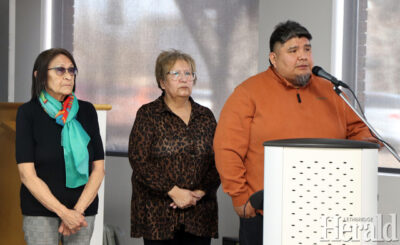Peacemaking program focus of SACPA session
By Steffanie Costigan - Lethbridge Herald Local Journalism Initiative Reporter on March 1, 2024.
 Herald photo by Steffanie Costigan
Sherry Tailfeathers, Debbie Melting Tallow and Leon Day Chief, of the Kainai Peacemaking Program, present on the topic of restorative justice during Thursday's SACPA session.
Herald photo by Steffanie Costigan
Sherry Tailfeathers, Debbie Melting Tallow and Leon Day Chief, of the Kainai Peacemaking Program, present on the topic of restorative justice during Thursday's SACPA session.Members of the Kainai Peacemaking program spoke Thursday to the Southern Alberta Council on Public Affairs about restorative justice which provides opportunities for individuals to resolve conflicts with the law.
Guest speakers were Kainai Peacemaking Program (KPP) administrative support/intake worker Debbie Melting Tallow, KPP community liaison/facilitator Sherry Tailfeathers, and program supervisor Leon Day Chief.
Melting Tallow was the first speaker and shared how the Crown will refer offenders to the Kainai Peacemaking program for mostly charges of assault, common assaults, domestic assaults and the KPP will work not only on domestic cases with the victim ,but also with the offender.
“We wanted to break that cycle and start working with the offender, which is usually male, but we’ve had lots of females that were the offender, and the victim. And then we started taking on assaults. It depends on the offender’s history, if he or she had a long history of assaults, well, maybe the Crown will hesitate, but it’s to his discretion, the Crown, to refer them,” said Melting Tallow.
Melting Tallow pointed out that previously KPP worked with 10 Peacemaker elders and currently they have 17 working with offenders.
“It’s all elder-based where they sit with the elder, the elder gives recommendations. After the first initial visit, the facilitator will read what the offender did.
“From there, the elder will take that and have a meeting with the client and then the elder will say, ‘OK, maybe you need anger management, maybe you need addictions counselling, maybe personal counselling’ any kind of counselling that the elder feels that the client needs,” she described.
She said every case they work on is kept strictly confidential within the KPP program.
“It’s a sense of the sacred respect, being kind and gentle. Once they come into our program, we treat them just like how we would treat our family members, we don’t interrogate them.”
Along with working with the offenders she shared how they also work with family members of offenders.
The second speaker was Tailfeathers. She said they work with clients for three months, scheduling six visits every two weeks and talked about other programs to help advise young parents.
“It’s a really good program. It’s a 12-week program that runs to help our young people learn about how to parent their children and that’s because so much was lost,” said Tailfeathers.
Tailfeathers said she will often go on-site visiting clients within Lethbridge, Cardston, Fort Macleod, and direct clients to mental health and addictions resources. She recognized Wednesday was Pink Shirt Day and how that applies to KPP.
“Yesterday was Pink Shirt Day, the anti-bullying, the kids working (with) people, wearing pink to be kind to people. You treat people with respect and in turn, you’ll get that, too,” she said.
Day Chief spoke on the importance of Blackfoot culture and language how it is implemented within KPP and the use of it among the Peacemaker elders.
He said how he, Melting Tallow, and Tailfeathers make efforts to transcribe to the court the Peacemaker elder’s recommendations and reports.
“Trying to transcribe and translate in terms where our elders understand. And then the three of us have come to the courts and explained the situation in English, which kind of takes a little bit to transcribe, but I believe we do a good job with supporting our elders,” said Day Chief.
18-17




